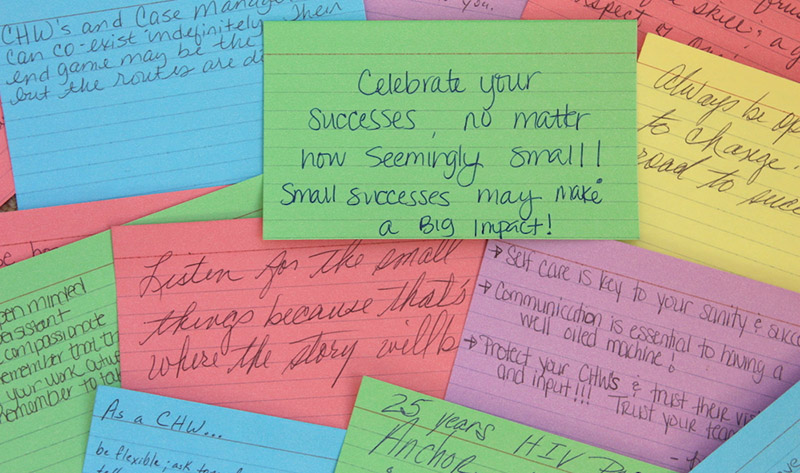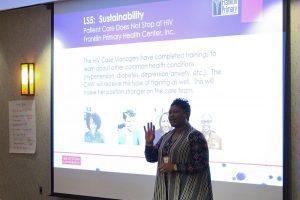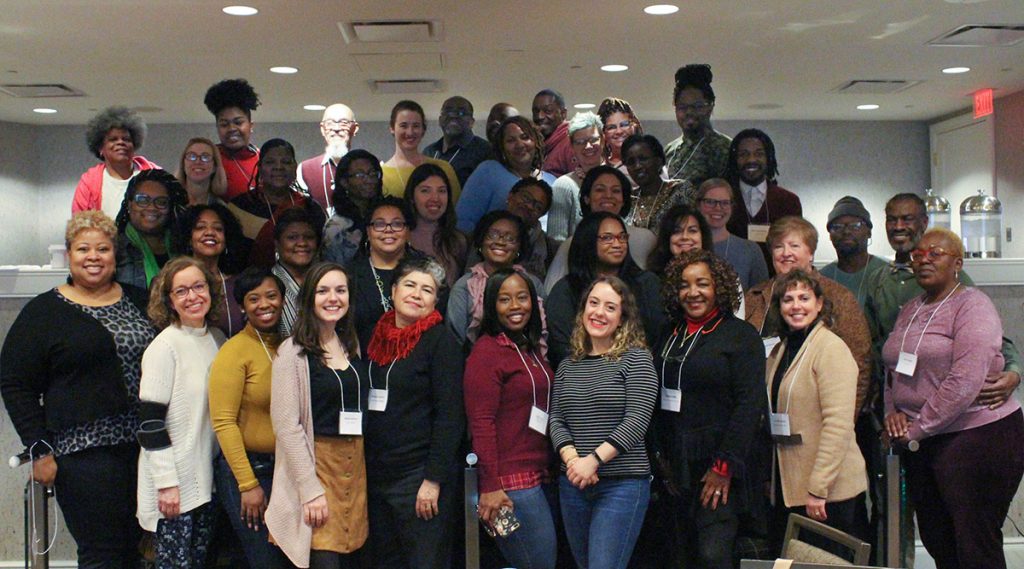Thursday, February 21, 2019

What does it take to be an effective Community Health Worker (CHW)? How can health organizations seeking to improve their outreach to marginalized communities best implement a CHW program? On January 15-17, 2019, the Center for Innovation in Social Work & Health (CISWH) hosted more than 30 CHWs and their supervisors to discuss these issues, share their accomplishments, and network.
With roots in the communities they serve, CHWs play a valuable role in connecting underserved populations to the health and social services they need. However, the roles and responsibilities of CHWs are not always clearly defined, and more health organizations could make use of CHW services if they had effective programs in place.
To help address this need, CISWH’s Improving Access to HIV Care Using CHWs project is providing training, evaluation, and technical assistance to ten HIV/AIDS service providers that are developing CHW programs. The January conference was part of a series of convenings that began in 2016, which will help inform the creation of resources for CHWs across the U.S.
During an interactive session, attendees shared their advice for CHWs and for organizations considering starting a CHW program. From logistics to working with clients, the session provided insight and words of encouragement relevant to CHWs in a range of settings. Below are some highlights from the discussion.
On working with clients:
“Connecting is the most important thing. Connect with providers regularly so they remember what you do. Connect with other departments so you know who to ask for resources. And connect with your clients in a genuine way. They are experts in their own experiences; use their expertise as you work together to improve health outcomes.” — CHW supervisor, Houston, TX
“Be flexible; ask tons of questions; don’t be afraid to tell your clients you don’t know the answer to a question they may have but you will try to find the answer; but most importantly, be open to learning new things.”— CHW, Mobile, AL
“Patience is a virtue. The ability to wait for something without frustration is a useful skill and a good aspect of one’s personality.” — CHW, Baltimore, MD
“Listen to the small things, because that’s where the story will be.” — CHW, Baltimore, MD
On developing a CHW program:
“Clearly define the roles and functions of the CHWs. This will avoid any role confusion.” — CHW supervisor, Las Vegas, NV
“CHWs and case managers can co-exist indefinitely. Their end game may be the same but the routes are different.” — CHW supervisor, Mobile, AL
“Choose CHWs who are flexible, open-minded/not afraid, knowledgeable, resourceful, dedicated, passionate. Create a system/structure for: regular check ins, communication, standardized documentation, and connecting the patients to the healthcare team and community resources.” — CHW supervisor, Baltimore, MD
“Continue to offer trainings and staff development, refreshers on motivational interviewing, conflict resolution, etc. Remember to say thank you for service and to those who go above and beyond – kudos!” — CHW supervisor, Lake Charles, LA
“Don’t be disappointed if you don’t see immediate change after implementing your program. Change sometimes happens slowly, no matter how much love and attention you are putting in.” — CHW, Houston, TX
On dealing with difficult times:
“Celebrate your successes, no matter how seemingly small. Small successes may make a big impact!” — CHW supervisor, New Orleans, LA
“Be encouraged; even when it seems no one is watching your hard work, someone is. Your ‘shine’ is not unnoticed.” — CHW, Fort Myers, FL
“Self-care should be your number one priority. Your work will be ineffective, lack passion, and direction if you aren’t intentional about taking care of you.” — CHW supervisor, Greenville, NC
“Open yourself to receive as much as you give. You are worth the effort, joy and passion you give to others.” — CHW, Birmingham, AL
Article and photos by Nilagia McCoy of the Center for Innovation in Social Work & Health.
The Improving Access to HIV Care Using CHWs project is supported by the Health Resources and Services Administration (HRSA) of the U.S. Department of Health and Human Services (HHS) under grant number U69HA30462 “Improving Access to Care: Using Community Health Workers to Improve Linkage and Retention in HIV Care” ($2,000,000 of federal funding). This information or content and conclusions are those of the author and should not be construed as the official position or policy of, nor should any endorsements be inferred by HRSA, HHS or the U.S. Government.


